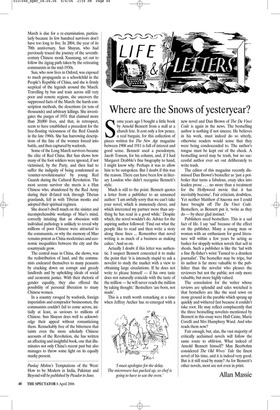Where are the Snows of yesteryear?
Some years ago I bought a little book by Arnold Bennett from a stall at a church fete. It cost only a few pence, a real bargain, for this collection of pieces written for The New Age magazine between 1908 and 1911 is full of interest and good sense. Bennett used a pseudonym, Jacob Tonson, for his column, and, if I had Margaret Drabble’s fine biography to hand, I might know why. Perhaps it was to allow him to be outspoken. But I doubt if this was the reason. There can have been few in literary London who didn’t recognise Bennett’s style.
Much is still to the point. Bennett quotes a letter from a publisher to an unnamed author: ‘I am awfully sorry that we can’t take your novel, which is immensely clever, and which interested my partner more than anything he has read in a good while.’ Despite which, the novel wouldn’t do. Advice for the aspiring author followed: ‘Find out what the people like to read and then write a story along these lines ... Remember that novel writing is as much of a business as making calico.’ And so on.
Actually I doubt if this letter was authentic. I suspect Bennett concocted it to make the point that ‘it is intensely stupid to ask a novelist to study the market with a view to obtaining large circulations. If he does not write to please himself — if his own taste does not naturally coincide with the taste of the million — he will never reach the million by taking thought.’ Bestsellers ‘are born, not made’.
This is a truth worth remarking at a time when Jeffrey Archer has re-emerged with a new novel and Dan Brown of The Da Vinci Code is again in the news. The bestselling author is nothing if not sincere. He believes in his work, must indeed do so utterly, otherwise readers would sense that they were being condescended to. The author’s tongue must be kept out of the cheek. A bestselling novel may be trash, but no successful author ever set out deliberately to write trash.
The editor of this magazine recently dismissed Dan Brown’s bestseller as ‘just a potboiler that turns a fabulous, crazy idea into leaden prose . . . no more than a treatment for the Hollywood movie that it has inevitably become’. Fair criticism, doubtless. Yet neither Matthew d’Ancona nor I could have brought off The Da Vinci Code. Bestsellers, as Bennett put it, ‘write as they do — by sheer glad instinct.’ Publishers need bestsellers. This is a sad fact of life. I say ‘sad’ because of the effect on the publisher. Many a young man or woman with an enthusiasm for good literature will within a few years be acting as barker for sloppily written novels that sell in shoals. Such a publisher is like the ‘lad with a fine fly-fisher’s wrist/ Turned to a drunken journalist’. The bestseller may be tripe, but its author is far more valuable to the publisher than the novelist who pleases the reviewers but not the public; not only more valuable, but more highly valued.
The consolation for the writer whose reviews are splendid and sales wretched is that bestsellers are like the seed sown on stony ground in the parable which sprang up quickly and withered fast because it couldn’t take root. He may reflect complacently that the three bestselling novelists mentioned by Bennett in this essay were Hall Caine, Marie Corelli and Mrs Humphrey Ward. And who reads them now?
Fair enough, but, alas, the vast majority of critically acclaimed novels will follow the same route to oblivion. What indeed of Arnold Bennett himself? Max Beerbohm considered The Old Wives’ Tale the finest novel of his time, and it is indeed very good. But is it still read by many? As for Bennett’s other novels, most are not even in print.
Allan Massie










































































 Previous page
Previous page